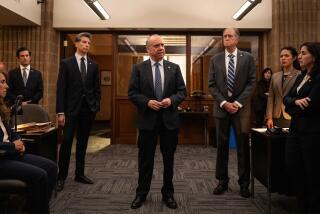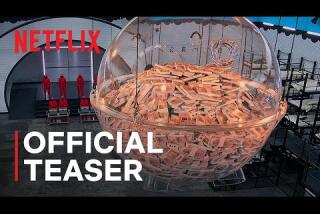‘Millionaire’ No Prize for Insurance Company
- Share via
LONDON — As the English see it, there’s a predictable pattern to the way Americans borrow and debase the great British contributions to international culture.
Americans took the noble language of Milton and Shakespeare and turned it into gangsta rap. They took the fluid, manly sport of rugby and turned it into football, with helmets, huddles and (ugh) TV timeouts.
And now Americans have taken that formidable British contribution to the world’s television schedules, “Who Wants to Be a Millionaire?” and dumbed it down to the point where just about anybody can take home the jackpot.
The hugely successful ABC-TV quiz show did not spring fully formed from the creative mind of Regis Philbin. Rather, “Who Wants to Be a Millionaire?” complete with the multiple-choice questions and “Is that your final answer?” was invented here and first broadcast on Britain’s ITV network. The British production company Celador has licensed it to ABC and a dozen other TV networks around the world.
And now the British insurance syndicate that funds the big payoffs on “Millionaire” has filed a lawsuit claiming that the American version of the show has questions so basic that the game is too easy to win.
Goshawk Syndicate, a group of brokers at Lloyd’s of London that agreed to pay off in case any contestant won a major prize, has filed suit in London’s high court complaining that it faces “unacceptable” losses because producers have made the show too easy.
Nobody has won the million on the British show, but one contestant took home the second prize, $800,000. By contrast, ABC has paid off two million-dollar winners and three other contestants who answered $500,000 questions.
The London insurance brokers argue that the questions on the U.S. edition have been dumbed down in a deliberate effort to produce more winners. Accordingly, Goshawk asked the court here to void the insurance policy covering big payouts.
ABC replied that “the integrity of ‘Millionaire’ is beyond reproach” and said the lawsuit is just a typical example of an insurance company “trying to deny coverage.” No matter what happens in court, though, the legal action has given the gleeful British media another excuse to haul out all their favorite stereotypes about stupid Americans.
“You don’t have to be a rocket scientist to become a millionaire-- you just have to be an American,” noted the Guardian newspaper. The lawsuit, said the Guardian, “has confirmed the suspicion of many British viewers that questions on the U.S. version of the show are easier” than the ones asked in Britain.
The Daily Telegraph ran a graphic showing “Recent questions from the U.S. show,” with such brain twisters as “How many full bags of wool are there in ‘Baa Baa Black Sheep’?” and “Which condiment is also known as a Latin dance: mustard, mayonnaise, relish or salsa?”
Even the toughest questions on the U.S. show have been belittled here. The first million-dollar winner, John Carpenter, took the prize when he correctly chose Richard Nixon as the U.S. president who appeared on “Rowan & Martin’s Laugh-In,” a popular comedy show in the late 1960s.
To win a million pounds (about $1.7 million) on the British show, however, you have to know things like “What is the title of the third part of T.S. Eliot’s ‘The Waste Land?’ ” or “What is the SI unit of magnetic flux density?” (Answers: “The Fire Sermon,” Tesla.)
One thing that “Millionaire” has in common on both sides of the Atlantic is enormous popularity. The 30 million American viewers who tune in three times a week made the crucial difference in giving ABC first place in the latest ratings sweepstakes. In Britain the show always ranks in the top 10, and a collection of “Millionaire” questions is on all the paperback bestseller lists.
But the British producer, Celador, came up with one gimmick that has not been tried by Buena Vista, the production company that bought the American rights. In both countries, people who want to be contestants on the show are advised to call a phone number and apply. In the United States it’s a toll-free call. But would-be contestants in Britain have to pay--the rate is about $1 a minute--to call and sign up for the show. Celador makes enough money on the phone fees to cover almost all of its prize payout.
Since the U.S. producers don’t have that income stream, they went to Lloyd’s for insurance, a fairly common procedure in the quiz-show business.
Goshawk agreed to cover the award payments to anybody winning either $500,000 or $1 million. Buena Vista, the producer, has to pay a deductible of $1.5 million, but after that the Lloyd’s brokers are liable.
The insurance syndicate evidently thought the American quiz would be as tough as its British counterpart. But once Goshawk saw how many big winners the American version produced, it ran to court to have its policy voided.
In its lawsuit, Goshawk says it demanded certain “controls” to make the U.S. program harder to win. For one thing, it wants tougher questions. For another, it wants ABC to stop screening prospective contestants for ability before they get on the show.
In the United States, you have to pass two quiz show-style tests before you can appear on “Millionaire.” In Britain, contestants are chosen at random from those who call. That means the average contestant in the United States is likely to do better than the average player on the British show.
Asked to comment on the lawsuit, Regis Philbin, of all people, declined to answer questions.
More to Read
Sign up for Essential California
The most important California stories and recommendations in your inbox every morning.
You may occasionally receive promotional content from the Los Angeles Times.













